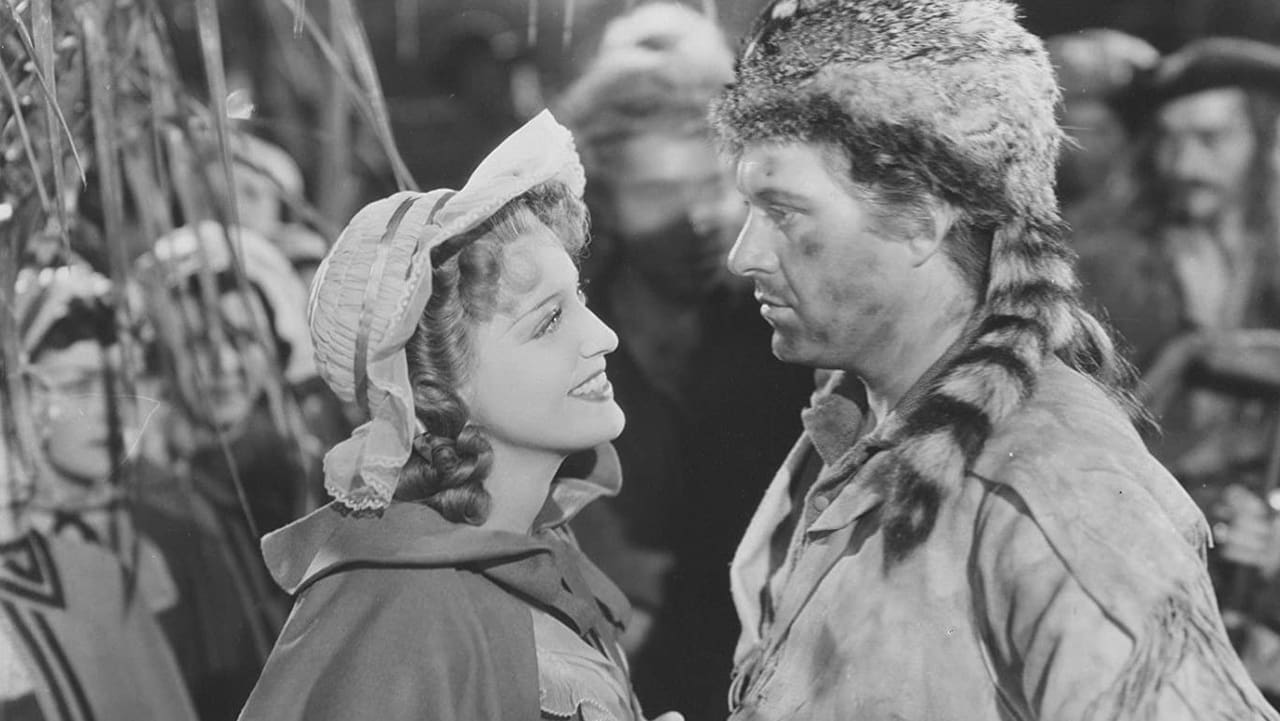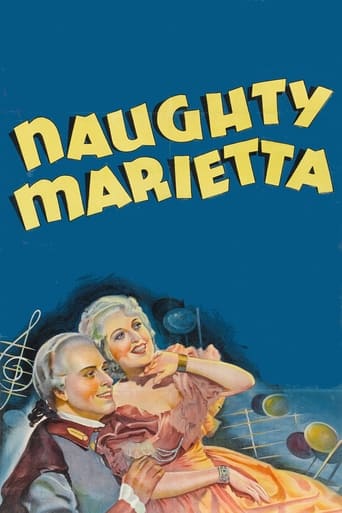

If you are familiar with operetta on film and anywhere, you'll know that the story is not going to be its strongest asset. That is the case with Naughty Marietta where the slight and predictable story is the least memorable component about it. Nelson Eddy's acting did mature and became more natural later on, he does have a charm about him here and he is appropriately dashing but there's also the sense of not being entirely in his comfort zone. Naughty Marietta is a lovely film to look at, the costumes and sets are lavish and the photography is skillful and allows you to enjoy the production values properly. The score fits beautifully, and the songs are some of Victor Herbert's best, especially Ah Sweet Mystery of Life, Tramp Tramp Tramp and Neath the Southern Moon. Italian Street Song and Falling in Love with Someone are great too. The dialogue is not only smart and witty but warm-hearted and charming, never too heavy on the sickly sweet sentimental stuff. Naughty Marietta also moves quickly, is choreographed in a spirited and never leaden fashion and solidly directed throughout. Nelson Eddy and Jeanette MacDonald work really well together, her acting is better and more natural than his but their chemistry is sweet. They both have beautiful voices too, Eddy in particular has one of the best on-screen voices of its voice type, and their rendition of Ah Sweet Mystery of Life is hauntingly beautiful. You can not go wrong with having Frank Morgan and Elsa Lanchester in supporting roles, both give fine support. All in all, a real charmer, not entirely sure whether it's their best collaboration(that's probably Maytime) but definitely worth the watch. 8/10 Bethany Cox
... View MoreThis is just a flat out good movie! Maybe I should say a GREAT movie. Although I've been a fan over the past few decades of many films and performers of the 1930s--including the amazing dancing team of (who else?) Fred Astaire and Ginger Rogers--until yesterday I'd never seen a film featuring Nelson Eddy and Jeanette MacDonald. Then, by chance a couple of weeks ago, I heard some singing by Eddy and started checking his and Jeanette's work on Youtube. This led me to many scenes and songs on good old Youtube. The singing was, well, fabulous, and the chemistry between the stars was kinetic, but I figured that, outside of the songs themselves, the movies would probably be syrupy sweet and impossibly dated. That seemed to be the buzz, and otherwise, why weren't they more popular with today's audiences. Still, I had to see a whole film after those tantalizing Youtube scenes. Still, actually finding their films isn't all that easy. There is nothing much on Netflix and few videos of any kind seem to be currently in print. Still, I managed to track down and buy a DVD of 'Naughty Marietta' from an independent outlet--and was amazed at how good it was, and not just the songs!It has a compelling plot, a whole variety of settings going up and down the social ladder from posh Louis XV Paris to the bayous of the rugged Louisiana frontier. It also features some appealing comic moments from MGM's team of crack character actors. Frank Morgan (later the man behind the curtain in the Wizard of Oz) particularly stands out as the likably incompetent governor of French colonial New Orleans. And even in their non-singing scenes, the chemistry between the two stars remains electric. I somehow hadn't realized, at least until my Youtube explorations, that Jeanette MacDonald was drop-dead gorgeous--but she was. She also had a great deal of vivacity and charm-- and, boy, could she sing. Eddy's acting has been criticized, and maybe he didn't have tremendous emotional range, but he does have a real presence on the screen along with that electric connection with Jeanette. And when he sings, his voice acts for him! Moreover, as a singer, he's even better than Jeanette.All in all, the effect is remarkable and one can see why these movies were so immensely popular in their own time. Moreover, overall, I'd rate the non-musical elements of Naughty Marietta (plot, dialog, characterization, acting, setting, thematic development) as superior to most or all of the non-musical moments of Astaire-Rogers, although their movies are, of course, far better known today. In Astaire-Rogers one is often wishing they'll get through this silly scene of dialog and get to the next dance, but that doesn't happen in Naughty Marietta, where the songs seem to grow organically out of the intriguing dramatic situations.I'm going to track down more films in the Eddy-MacDonald series. This one certainly far exceeded my expectations!
... View More"Naughty Marietta" is acknowledged to be the initial memorable pairing of Nelson Eddy and Jeanette MacDonald in the still popular field of operetta and light opera.The terrible oppression of the Depression decade was relieved by the happy smiling Shirley Temple, the Dick Powell/Busby Berkeley musicals, and the screwball comedies of Irene Dunne, Cary Grant, William Powell, Rosalind Russell, Carole Lombard, et al.But the happy pairing of Nelson and Jeanette with their glorious duets and individual performances of the music of Victor Herbert, Rudolph Friml and Sigmund Romberg appealed to the many who found much solace in the sound of two balanced voices joined in melodic songs. Jeanette MacDonald had already made many musicals with Maurice Chevalier and Ramon Navarro but the music of Victor Herbert seemed to afford the opportunity for her to display her particular talents to advantage.While still a princess in Europe, she has a chance to sing the lilting "Chansonette". And as the boat leaves France for the new world, "Prayer" includes strains of the popular "Yesterthoughts". In the new world, Nelson Eddy has an opportunity to introduce himself with the famous "Tramp, Tramp, Tramp" rouser. Later, around the campfire, he does a marvelous job with "The Owl and the Polecat". Two lovely ballads that Victor Herbert provided are also included. " 'Neath the Southern Moon" and "I'm Falling in Love With Someone". Jeanette also has an opportunity to shine with the "Italian Street Song".But, of course, the song that everyone remembers is "Ah, Sweet Mystery of Life" which develops over the life of the picture from the beginning scenes with Jeanette's teacher in Paris to the final scenes in the New World when it becomes a soaring duet.If operetta or light opera music is not your cup of tea, this movie may not have much appeal for you. Admittedly, this is the music of a century ago. But there are many movie viewers who do savor this type of music and for them, "Naughty Marietta" is a real treat. It even has delightful moments of comedy with Frank Morgan,Elsa Lanchester and Edward Brophy.Both for insight into film history, music history and just plain entertainment, this movie is an enjoyable diversion. An hour and a half or so in today's busy world is not too much to expend for a bit of nostalgia. If you do discover a 'new world' , there are many other treats awaiting you. "Naughty Marietta" was only the first in a long series of films such as Rose Marie"; "New Moon" "Maytime"; "Girl of the Golden West"; etc.
... View MoreI love this movie & have watched it many times. It's funny, sweet and true love triumphs. And the duet on the stairs is one of the most passionate scenes I've ever had the pleasure of seeing in the movies - it never fails to bring tears to my eyes.
... View More